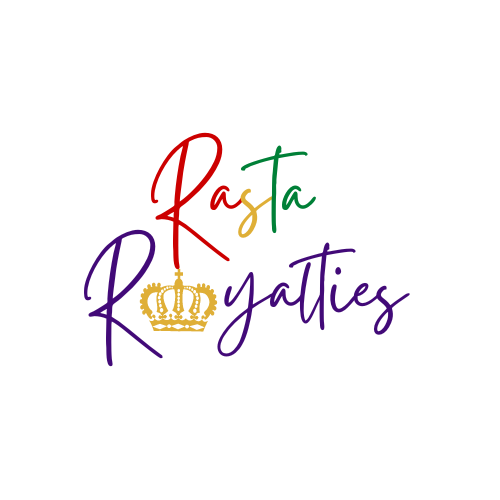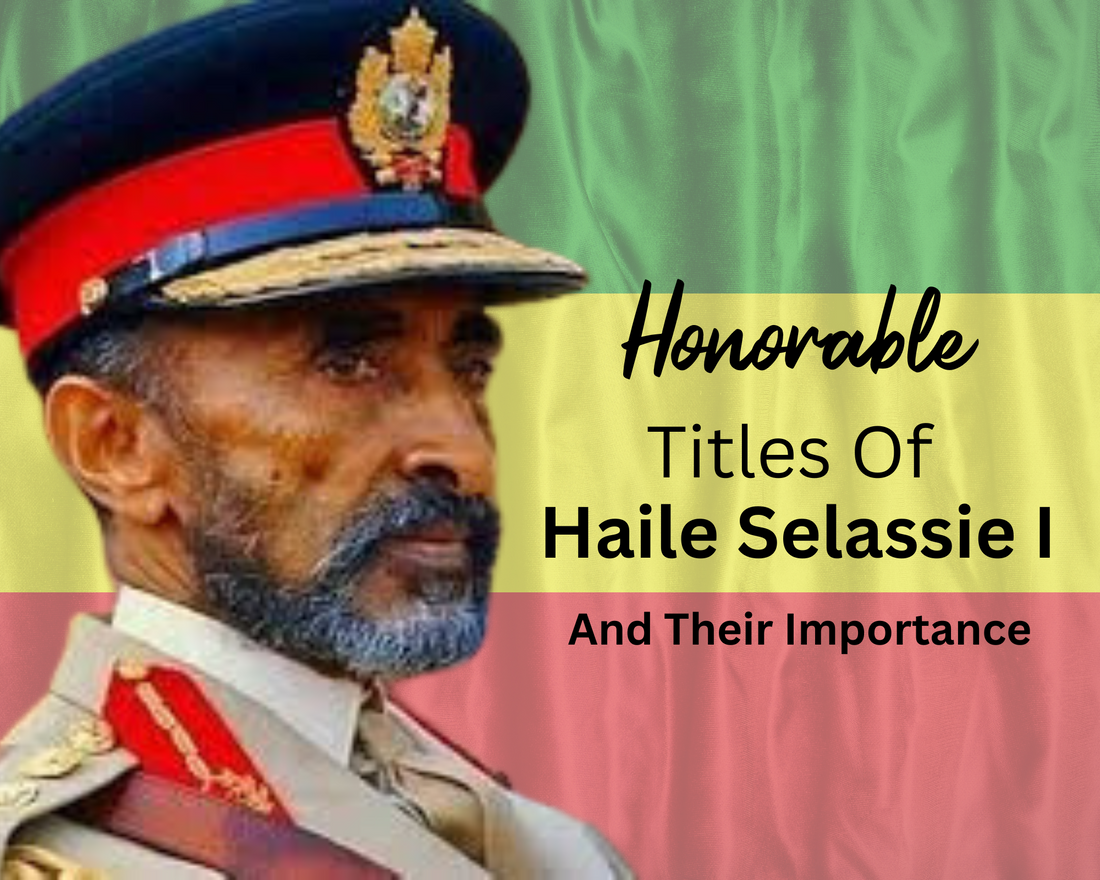Greetings, in the name of Qedamawi Haile Selassie I, King of Kings, Lord of Lords, The Conquering Lion of Judah.
In history, many individuals emerge as mysterious figures, their influence extending far beyond their lifetimes. Emperor Haile Selassie I, a luminary revered in Ethiopian history and the heart of the Rastafarian way of life, adorned himself with a multitude of titles that express his high significance. Each title was more than a mere formality; it was a reflection of his role as a leader, a symbol, and a spiritual guide as GOD himself. We'll dive deep into the diverse titles worn by Haile Selassie !, revealing the layers of his identity and the permanent mark he gives to the world.
1. Ras Tafari
Before the world knew him as Emperor Haile Selassie I, a transformative figure was emerging in the heart of Ethiopia. Ras Tafari, a title that means "Head" or "Leader" in Amharic, laid the foundation for a way of life that would transcend borders, beliefs, and time itself. In the early 20th century, Ras Tafari stood at the point of a changing world. Born Lij Tafari Makonnen, he rose through the ranks of Ethiopian nobility to become a regent and eventually the Emperor. It was during this time that he embraced the title "Ras," a symbol of leadership that would soon intertwine with a movement (way of life) of high significance.
The resonance of Ras Tafari's name echoed far beyond Ethiopian borders. In Jamaica, a community found hope and empowerment in the name, gradually evolving it into the term "Rastafarian." This connection wasn't just verbal; it was spiritual, rooted in the belief that Ras Tafari held a divine significance that transcended politics.
2. Haile Selassie I: Might of the Trinity
"Haile Selassie I" isn't just a name, it's a declaration of divine might. Each word, "Haile" and "Selassie," carries a heavy significance, but it's when they're combined that their true spiritual power emerges.
The title "Might of the Trinity" emphasizes the spiritual connection between Haile Selassie I and the Holy Trinity – the Father, Son, and Holy Spirit. This unity in three aspects reflects the togetherness of divine forces and serves as a reminder of the oneness that binds all of creation. This title speaks to Haile Selassie I's role as a living representation of divine authority on Earth. His presence as the "Might of the Trinity" signifies the embodiment of spiritual principles and virtues.
The concept of the Holy Trinity resonates with Rastafarian ideals of unity, balance, and togetherness. Just as the Father, Son, and Holy Spirit coexist harmoniously, it's important to embody these qualities in relationships with one another and the world.
3. Emperor of Ethiopia
As Haile Selassie ascended to the throne, the title "Emperor of Ethiopia" symbolized the peak of his authority. It marked not only his political role but also his status as the custodian of Ethiopia's heritage, traditions, and sovereignty.
Embracing the title "Emperor of Ethiopia" meant accepting the weight of a legacy that stretched back through generations. Haile Selassie became the guardian of Ethiopia's rich history, rooted in ancient civilizations, dynasties, and cultural treasures.
Haile Selassie's reign as Emperor helped in a period of modernization and progress. He aimed to transform Ethiopia into a modern nation while preserving its unique cultural identity. The title "Emperor of Ethiopia" bore witness to his vision of a nation that could reconcile its history with the demands of a changing world.
The title "Emperor of Ethiopia" resonates deep within Rasta's way of life. Haile Selassie's coronation fulfilled prophecies, affirming his divinity and the legitimacy of his rule. The title's spiritual significance is integral to Rastas in his embodiment of Jah (God) on Earth.
4. Negus: Negusa Nagast (King of Kings)
With his ascension to the imperial throne, Haile Selassie assumed the title of Negus, a term signifying kingship. Yet, this title went beyond just rulership. It carried with it the weight of Ethiopia's storied history, reflecting his role as a ruler within the lineage of monarchs who had come before him.
The title "Negus" also carries the concept of "King of Kings," evoking imagery of a ruler who stood above other rulers – a figure of authority on the global stage. This association with being the "King of Kings" served as a reminder of Ethiopia's historical significance as an empire that once stretched far beyond its borders. Haile Selassie's embodiment of this title has an enduring legacy within Ethiopia and resonates with Rasta's way of life worldwide.
The Negusa Nagast title wasn't just a representation of a monarchy; it became a symbol of spiritual unity, cultural identity, and empowerment within the Rastafarian way of life. Haile Selassie I, as the King of Kings, embodied the principles that Rastafarians held dear – a commitment to justice, equality, and unity among all beings.
5. Conquering Lion of the Tribe of Judah
In the heart of Rastafarian culture lies a title that resonates with biblical significance and carries spiritual importance – "Conquering Lion of the Tribe of Judah." This title, attributed to Emperor Haile Selassie I, goes beyond its majestic imagery; it embodies a connection to ancient lineage, a symbol of strength, and a representation of divine authority.
The title "Conquering Lion of the Tribe of Judah" draws from the Book of Revelation in the Bible, specifically the reference to the Lion of Judah. This connection to biblical prophecy places Emperor Haile Selassie I within the lineage of King Solomon and the valued Tribe of Judah, linking him to an ancient heritage of strength and significance.
The imagery of a lion represents power, strength, and courage across cultures. Within Rasta's way of life, the "Conquering Lion" symbolizes the relentless resilience of African descendants who have faced oppression and adversity throughout history. The title reflects the enduring spirit of those who strive for justice and equality. This title roars with spiritual significance, unity, and a call to stand against oppression. It's a signal of hope.
6. Elect of God and Light of the World
The title "Elect of God" carries the implication of being chosen by divine will. Within Rastafarian truth, this designation aligns Haile Selassie I with a higher purpose – a vessel through which divine guidance and leadership flow. This title underlines his significance beyond worldly affairs, marking him as a channel of spiritual significance.
The title "Light of the World" draws parallels to the symbolic light that dispels darkness, both in a spiritual and literal sense. Haile Selassie I, is seen as a source of spiritual enlightenment, a guiding force that shines through the shadows of oppression and injustice.
7. Prince of Peace
The title "Prince of Peace" also holds a place of profound significance. It combines a vision of unity, tranquility, and the aspiration for a world free from conflict and oppression. Haile Selassie I guide Rastas toward a path of understanding and acceptance, not only among themselves but within the global community.
It symbolizes not only the divine attributes of Haile Selassie I but also Rasta's relentless commitment to creating a path toward lasting peace – a journey fueled by love, unity, and the pursuit of a world where all beings live in harmony.
8. Defender of the Faith
The title "Defender of the Faith" carries a resonance that echoes through time. It marks Haile Selassie I's role as a protector of Ethiopia's ancient Christian faith – a faith rooted in history and tradition, and a pillar of strength for Ethiopian culture.
In the face of foreign invasions and imperial ambitions, Haile Selassie I stood as a symbol of resistance against oppression. The title "Defender of the Faith" signified his determination to safeguard not only the faith but also the sovereignty and dignity of his nation.
The title "Defender of the Faith" goes beyond the earthly realm. It holds a spiritual resonance that aligns with Rastafarian principles of divine authority, resistance against injustice, and the pursuit of a better future.
9. King of Zion
Zion holds a place of deep significance in Rastafarian and Ethiopian history. It refers not only to the biblical Jerusalem but also symbolizes a spiritual homeland, a place of connection to heritage, and a vision of unity and liberation.
The title "King of Zion" aligns Haile Selassie I with the spiritual leadership of Ethiopia. Rastafarians view him as the embodiment of this spiritual authority, carrying forth the legacy of ancient kings and emphasizing the importance of justice, compassion, and unity.
The title "King of Zion" also signifies a divine connection, as Zion is often associated with the spiritual realm. Within the Rastafarian way of life, Haile Selassie bridges the gap between the earthly and the divine, embodying a spiritual authority that guides believers on their journey.
The titles granted upon Emperor Haile Selassie I are not just labels; they are windows into the core of Rastafarian truth. From "Conquering Lion of the Tribe of Judah" to "King of Zion," each title symbolizes unity, strength, and spiritual significance. These titles transcend time, guiding us toward unity, justice, and a world shaped by divine principles. As we reflect on these titles, we embrace a legacy that inspires us to embody these ideals, fostering positive change and embracing a path illuminated by love, unity, and spiritual insight.
With the guidance of Qedamawi Haile Selassie, Blessed Love.
Ras Troy

